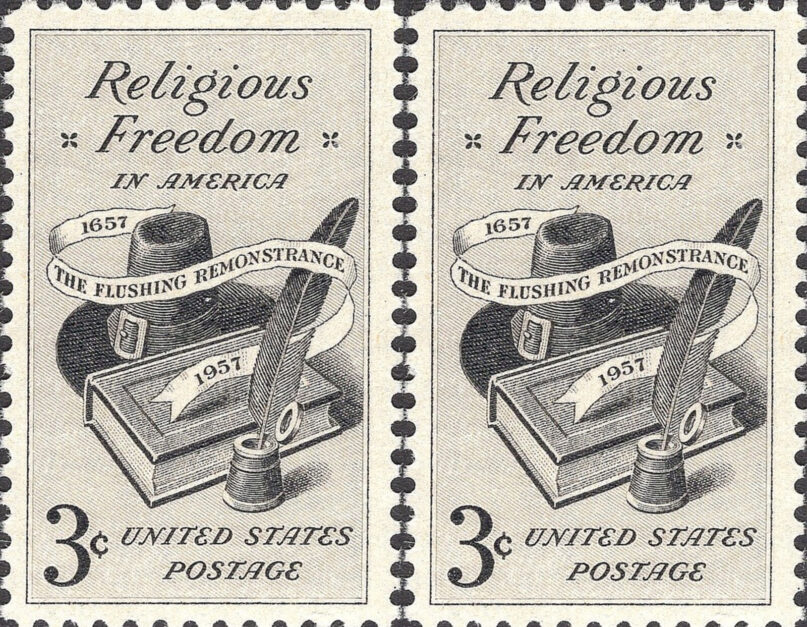(RNS) — The results from the religious liberty quiz I gave last week are in, and while the 16 responses hardly constitute a statistically significant sample, they are suggestive. Submitted as comments (you can check them out) and in a few instances via email or Facebook, they indicate a less expansive view of religious liberty than taken by current law.
Overall, more than a third supported a right to religious liberty in some circumstances, with 19% answering “yes” to the 25 queries in last week’s column, and 15% saying “it depends.” Those answering with a solid “no” were 63%, while “not sure” and “no answer” added up to 4%.
The strongest support came for a religious right of students not to say the Pledge of Allegiance, with 10 “yes,” two “it depends” and zero “no.” The question derives from West Virginia State Board of Education v. Barnette (1943), the landmark case in which the U.S. Supreme Court reversed a mere four-year-old precedent and found in favor of a Jehovah’s Witnesses family on free speech grounds.
Next strongest came support for the right of military personnel and the incarcerated to wear religiously mandated headgear — 10 “yes” votes versus three “no” votes in the first, nine versus three in the second.
This support for military personnel is at variance with Goldman v. Weinberger, a 1986 case in which the Supreme Court decided that the authority of the armed forces to dictate dress outweighed an Orthodox Jewish Air Force chaplain’s desire to wear a yarmulke on base. Notably, however, a Defense Department directive issued in September of last year pushed for the opposite position.
RELATED: Florida church says offering free beach parking is a religious act. Judge agrees.
As for incarcerated persons, the 2000 Religious Land Use and Institutionalized Persons Act (RLUIPA) instructs prisons to permit religious headgear so long as there is no compelling reason not to.
Seven respondents said that Indigenous people should have the right to refuse infrastructure construction on land they deem sacred and another seven said “it depends,” as opposed to just one who said they shouldn’t. Such a right might seem to be recognized by the 1978 American Indian Religious Freedom Act; however, in 1998 the Supreme Court found otherwise, ruling that the act contains no judicially enforceable rights in a case involving a portion of a National Forest that has traditionally been used for religious purposes by three tribes in northwestern California.
At the other extreme, all 16 respondents turned thumbs-down on a right of for-profit companies to refuse to cover contraceptive services in their health insurance bans. While this is in line with survey research, in Hobby Lobby (2014) the Supreme Court decided that private companies do in fact have such a right.
There was also unanimity in opposing a religious right for businesses to discriminate on the basis of race or gender, and 15 “no” votes (versus a single “it depends”) on pharmacists having a religious right not to sell customers contraceptives.
It’s impossible to say whether my respondents would have answered the same way had I asked specifically about a religious right not to bake cakes, provide flowers or do photography for same-sex weddings. Although the Supreme Court has yet to decide such a case on the merits (Masterpiece Cakeshop, despite the hype, didn’t do so), public opinion is closely divided. A number of states have “conscience clauses” that give pharmacists the right to refuse to sell contraceptives.
Readers opposed by strong majorities giving religious organizations exemptions from zoning and anti-discrimination laws, despite provisions of RLUIPA that allow houses of worship and other religious institutions to avoid zoning law restrictions and the Supreme Court’s recognition, in the 2012 Hosanna-Tabor case, of a broad “ministerial” exemption allowing religious organizations to hire and fire whoever they like.
Thirteen respondents opposed religious exemptions from vaccination under any circumstances, 10 when medical exemptions are allowed. Thus far the courts have upheld the Supreme Court’s 1905 Jacobson decision, which recognizes a governmental power to impose mandatory vaccination to protect public health.
Unsurprisingly, no one said “yes” to a right to ritual cannibalism, albeit several respondents, presumably waggishly, answered “it depends,” adding explanatory notes about eating dead bodies, transubstantiation (consuming what is believed to be the body of Christ) and “only if you are cannibalizing yourself.”
The closest divide came on the question of a religious right not to work on one’s holy day: seven voted “yes,” four “it depends” and six “no.” Even though neither the courts nor the federal government recognizes such a right, Title VII of the 1964 Civil Rights Act requires employers to make reasonable accommodations for religious observances unless these can be shown to impose “undue hardship” on the employer.
RELATED: How a little-known federal land use law could help combat antisemitism in America
Eight respondents opposed a religious right to polygamy as opposed to three votes of “yes” and five “it depends.” On a woman’s right to procure an abortion regardless of state regulations, it was nine “yes,” five “no” and three “it depends.”
So while my respondents tended to support strong religious liberty protections for individuals so long as these don’t get in the way of other individuals, they afforded religious institutions very little in the way of special treatment.
Bottom line: The respondents line up well with Madison and Jefferson and the Baptists who supported them in the early days of the Republic. Not so much with the religious liberty enthusiasts who are ascendant in the Republican Party today.






